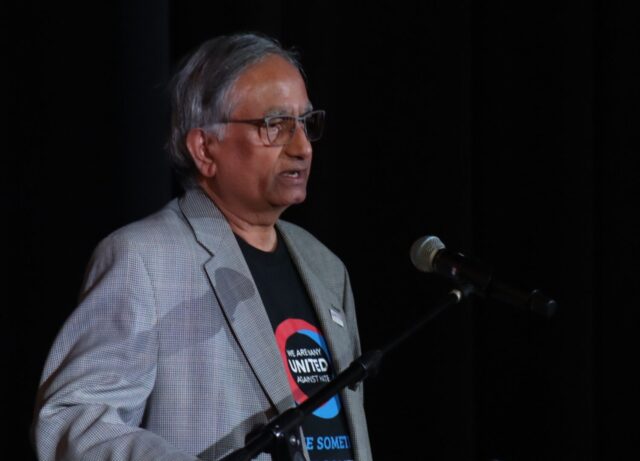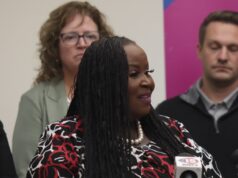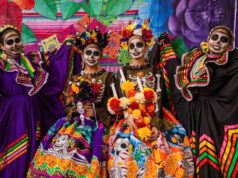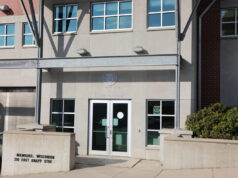As a child, he was asked where he wanted to go by his father and he responded with a clear certainty “the United States.” Now, around 50 years later he pushes to unite the world and give back to the country that allowed him to pursue his dreams. Masood Akhtar is an Indian-born Muslim who has been around multiple spheres in entrepreneurship, politics and activism. However, his journey started with taking a chance at a fellowship to study abroad.
He saw the opportunity in an Indian newspaper. The government of India wanted to send 50 students to study abroad in countries of their choice, but the competition was steep. Akhtar estimated that around 60,000 people applied across the country with only 200 accepted into the next round. Akhtar had luck on his side as he was selected in the initial pool and pushed through to be one of the few to receive the fellowship. He realized this was his chance to make his dream come true.
“When my fellowship ended two years later, my dad called me and said ‘Well, now your funding has ended and you have a wonderful job offer here in India. What do you want to do?’” Akhtar said. “I said, ‘Now that I’ve been living here for two years, I can tell you that I was right when I told you when I was seven that the United States, the country where I wanted to go live and fulfill my dream and practice my religion, was right.”
Akhtar was now on his path to pursue a new dream — one where he would give back to others. He had three goals in mind. First, he wanted to find an avenue to give back to the United States. Akhtar also wanted to find a way to give back to those in his native India. Lastly, because education has been his passion and he felt its transformational power, he wanted to make sure every child, regardless of who they are, had the chance to obtain higher education.
His father acknowledged his dream but also noted that he couldn’t pursue it if he went back home. He encouraged Akhtar to stay in the United States.
Soon he moved into the start of his career where he became involved in entrepreneurial ventures in the energy sector and investment policy at the local and state levels. However, a cataclysmic event that shook the U.S. pushed Akhtar in another direction.
The fallout of 9/11 and the Islamophobia that ensued pushed Akhtar to move towards community organizing.
“Now we have a problem. People who don’t know about Islam and Muslims will think that Islam teaches terrorism, which has nothing to do with it at all,” Akhtar said. ”After 9/11, I got heavily involved with organizing many events, reaching out to people, whether it is one-on-one or the community, to say, ‘Look, Islam is not what you see on television.’”
He tried to reach people’s hearts through real-life stories to battle continued misconceptions of his religion — and he found success with the approach. In 2016, another opportunity struck him when he was approached by WKOW 27 TV here in Madison. Discussions of starting a Muslim registry in the United States circled as a prominent idea under President Donald Trump’s first term in office.
“I almost fell out of my chair when I heard that because I saw what happened when Hitler started a Jewish registry in Germany,” Akhtar said. “[WKOW] said, ‘Well, can you come on television and talk about it?’”
He didn’t know what he was going to say on TV, but he knew that he needed it to be important. Akhtar has long lived by the principle “If you see something, say something but do something.” So that’s what he did on the show.
Akhtar told his tale as an Indian Muslim who came to the United States to pursue his dream and practice his religion freely with passion to touch the hearts of those watching. He felt that singling out a specific minority based on religion is not what the U.S. is about or why he came here.
The idea of a registry did inspire him, however. On TV, Akhtar declared that he would make a registry of his own not based on hate. He wanted to create an avenue for people to come together regardless of their background dubbed the “Anti-Hate Registry.” The registry would serve as the foundation for his later venture We Are Many United (WAMU).
People resonated with his early vision and he immediately started to receive hundreds of emails asking to sign them up.
“This is exactly what’s needed, at least over the next four years, to keep this country united and not divided,” Akhtar said.
He pressed on to form an advisory board with the intention to educate the community and battle against hate. Aktar wanted everyone he could find involved with unique points of view. He reached out to both political parties, people of different religious backgrounds, and nationalities, former neo-Nazis, an Al Qaeda recruiter, a KKK leader and many others.
“I recruited all of them because at one point they were the largest hate group,” Akhtar said. “I realized when I took them to classrooms and the community, students were getting very excited. That’s how this movement started. We’ll be united against hate.”
Interest in Akhtar’s work continued to garner attention. He soon received waves of national recognition from the FBI, the Biden Administration, the Department of State, the Southern Poverty Law Center and many other locals to Wisconsin. His model for battling hate had him honored as a “Uniter” by former President Joe Biden in 2022.
The same year he received presidential recognition, the Department of State asked Akhtar to host delegates from Africa, Europe and the Middle East to host a session on combating violent extremism.
Akhtar kept with his mission where he started a youth summit for WAMU in 2024. The first summit was held at McFarland High School where it was well received by students and faculty. They wanted another round of the Youth Unity Summit the next year. He expanded efforts to host another at McFarland in Feb. 2025 and a second in Wisconsin Rapids. Akhtar hopes to bring the venture into more schools around the country — and later the whole country.
Looking back, with consideration of what he said in 2016 on WKOW, Akhtar still firmly believes in what he proclaimed to this day.
“If you ask me the question today, I would pause. That pause is going to be very long because of the political situation,” Ahkar said. “I still believe that in America, the love we have is still powerful and unity is still our strength. Hope is still our constitution. I still believe in it and that’s the reason I’m continuously fighting and bringing people together to make sure this country remains united.”










